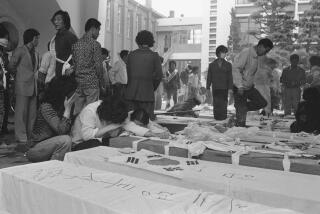U.S. Won’t Let 2 Officials Testify in S. Korean Probe
- Share via
WASHINGTON — The United States on Friday rejected a request by South Korea to have two former American officials testify about the events surrounding Chun Doo Hwan’s bloody suppression of demonstrations eight years ago.
The South Korean National Assembly has been seeking to question former U.S. Ambassador William H. Gleysteen and Gen. John A. Wickham as part of an ongoing investigation of what is now known as the Kwangju massacre, a 1980 incident in which South Korean troops used force to quell an anti-government uprising.
By the official count of the South Korean government, 193 people were killed, but some local residents have said the death toll was at least twice that number.
U.S. Role Charged
South Koreans have charged that U.S. officials either worked with Chun to put down the insurrection or gave permission for the use of South Korean troops in the crackdown.
The effect of refusing to permit American testimony is to avoid having the United States entangled too deeply in the South Korean investigations of Chun, who seized power behind the scenes in a 1979 mutiny within the military and later became president. Chun stepped down as South Korea’s president last February. For the past two years, the United States has been trying to distance itself from public identification with Chun and his unpopular regime.
“After careful consideration of the relevant and diplomatic precedents and legal principles . . . the (State) Department has determined that it would be inappropriate for Ambassador Gleysteen or Gen. Wickham to testify before the (South Korean National Assembly) committee on matters related to their official duties for the United States government in South Korea,” State Department spokeswoman Phyllis Oakley said Friday.
She said, however, that the State Department would be willing to respond to written questions from the South Korean committee about the Kwangju incident. The State Department answers would include the facts known by Gleysteen and Wickham, Oakley said.
The Kwangju insurrection began as a series of demonstrations that turned into a popular insurrection on May 19, 1980, after a martial-law crackdown and the arrest of opposition leaders, including Kim Dae Jung, whose base is in the Kwangju region.
At the time, Wickham was in command of all U.S. forces in South Korea and of most South Korean troops as well. Chun, who as a leading military commander and acting intelligence chief exercised effective control in the country, dispatched elite South Korean troops to Kwangju to quell the uprising on May 27.
Two years ago, in a series of public appearances in Seoul, Gleysteen said that the South Korean troops Chun sent to Kwangju “were not under U.S. command” and that the United States told Chun that using the elite Korean troops was “a very dangerous idea.”
More to Read
Sign up for Essential California
The most important California stories and recommendations in your inbox every morning.
You may occasionally receive promotional content from the Los Angeles Times.













